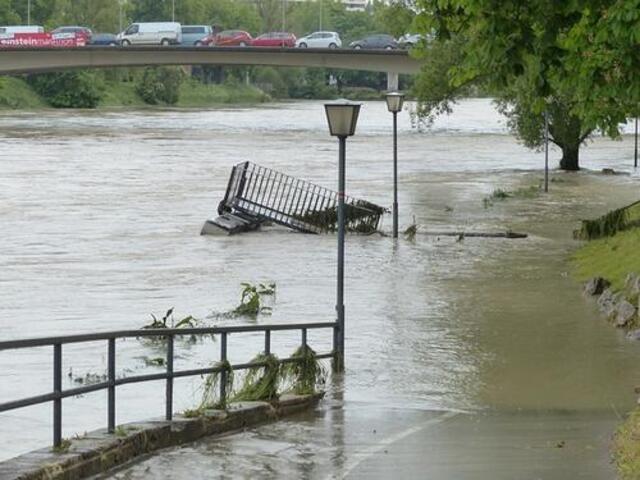
Weathering the Storm: Developing a New Flood Risk Standard for Canadian Communities
Flooding within urban centres is Canada’s costliest and fastest growing extreme weather challenge.

Flooding within urban centres is Canada’s costliest and fastest growing extreme weather challenge.
By Media RelationsInsurable claims in Canada have risen from an average of $405 million per year between 1983 and 2008 to an average of $1.8 billion per year between 2009 and 2017 (in $2017), with flooding contributing the greatest proportion of this increase.
Against the backdrop of unavoidable climate change, the need to limit this risk will only grow. In an effort to alleviate future flood risk, a new report from the Intact Centre on Climate Adaptation, University of Waterloo, highlights a range of solutions that can be deployed practically and cost-effectively within communities and households.

This report was supported financially by the National Research Council of Canada, the Standards Council of Canada and the Intact Financial Corporation, with the objective to fund the development of a National Standard of Canada by SCC-accredited standards development organizations. It features a unique framework for screening flood hazards and vulnerabilities to select areas within communities that should be targeted for flood-resiliency retrofits – a result of an extensive, year-long consultation with municipal experts, engineering consultants, conservation authorities and industry representatives from across the nation.
“Extreme weather caused by climate change is both a societal issue and an economic priority – there is a role for all of us to play in building a more resilient society. The Intact Centre “Weathering the Storm” report provides Canada with clear, practical steps to protect our communities against flood damage. Being resilient means adapting to our new climate reality – build in the right place, build right the first time, and build back better,” said Monika Federau, Chief Strategy Officer at Intact Financial Corporation.
Titled Weathering the Storm: Developing a Canadian Standard for Flood-Resilient Existing Communities, the report includes such measures as:
Proactive maintenance of flood control structures such as culverts, bridges, dykes and channels to ensure that they perform as intended during storm conditions;
Construction of strategically placed stormwater storage tanks and stormwater ponds within and around communities;
Removal of snow from critical overland flow path locations prior to forecasted flood events;
Clearing of leaves and debris from catch basins, particularly during Fall and Spring;
Re-grading of lots and roadways to carry water away from properties and onto streets and right-of-ways;
Installing backwater valves (sometimes called a backflow or sewer backup valve) on sewer line within basements, and disconnecting downspouts from weeping tiles, to limit sewer backup flooding;
Sealing manhole covers in low-lying areas where water accumulates and has a higher risk of causing sewer backup flooding;
Implementing stormwater diversion projects such as piping that can direct excess stormwater away from flood vulnerable areas; and
Delivering public education programs on flood prevention and maintenance activities to homeowners, municipal staff, insurance brokers and real estate agents.
As extreme weather becomes more severe and frequent due to climate change, every effort must be made today to better protect existing communities from future damage and destruction. This aligns well with the climate commitments made by Canada as a signatory to the Paris Agreement, the United Nations’ Sendai Framework for Disaster Risk Reduction, and the Pan-Canadian Framework on Clean Growth and Climate Change.
Quotes:
“The Standards Council of Canada (SCC) is leading the way in recognizing the impact of flooding and by working with the Intact Centre on Climate Adaptation, and our accredited standards development organizations, SCC is laying the foundation for a new national standard that will ensure flood resilience in Canadian communities. This collaboration is another example of how standardization strategies can strengthen Canadian infrastructure against climate change—and protect vulnerable communities across the country.”
Chantal Guay, CEO of the Standards Council of Canada
“The National Research Council is committed to the continued support of partners like the Intact Centre on Climate Adaptation; the Canadian Commission on Building and Fire Codes; and standards development organizations. This support ensures that climate change adaptation and resiliency measures introduced into Codes, standards and guides are based on the latest science and research to protect Canada’s critical infrastructure, homes and buildings, providing a safer environment for all Canadians.”
Philip Rizcallah, Program Director, National Research Council of Canada

Read more
Waterloo co-op students earn opportunity to contribute to SickKids research

Read more
As the world commemorates Earth Day 2024, a Waterloo researcher shares how we can unlock more Canadian restoration solutions with community and academic collaboration

Read more
Waterloo launches first-of-its-kind interdisciplinary graduate diploma in climate change to provide additional resources for the global climate crisis
The University of Waterloo acknowledges that much of our work takes place on the traditional territory of the Neutral, Anishinaabeg and Haudenosaunee peoples. Our main campus is situated on the Haldimand Tract, the land granted to the Six Nations that includes six miles on each side of the Grand River. Our active work toward reconciliation takes place across our campuses through research, learning, teaching, and community building, and is co-ordinated within the Office of Indigenous Relations.